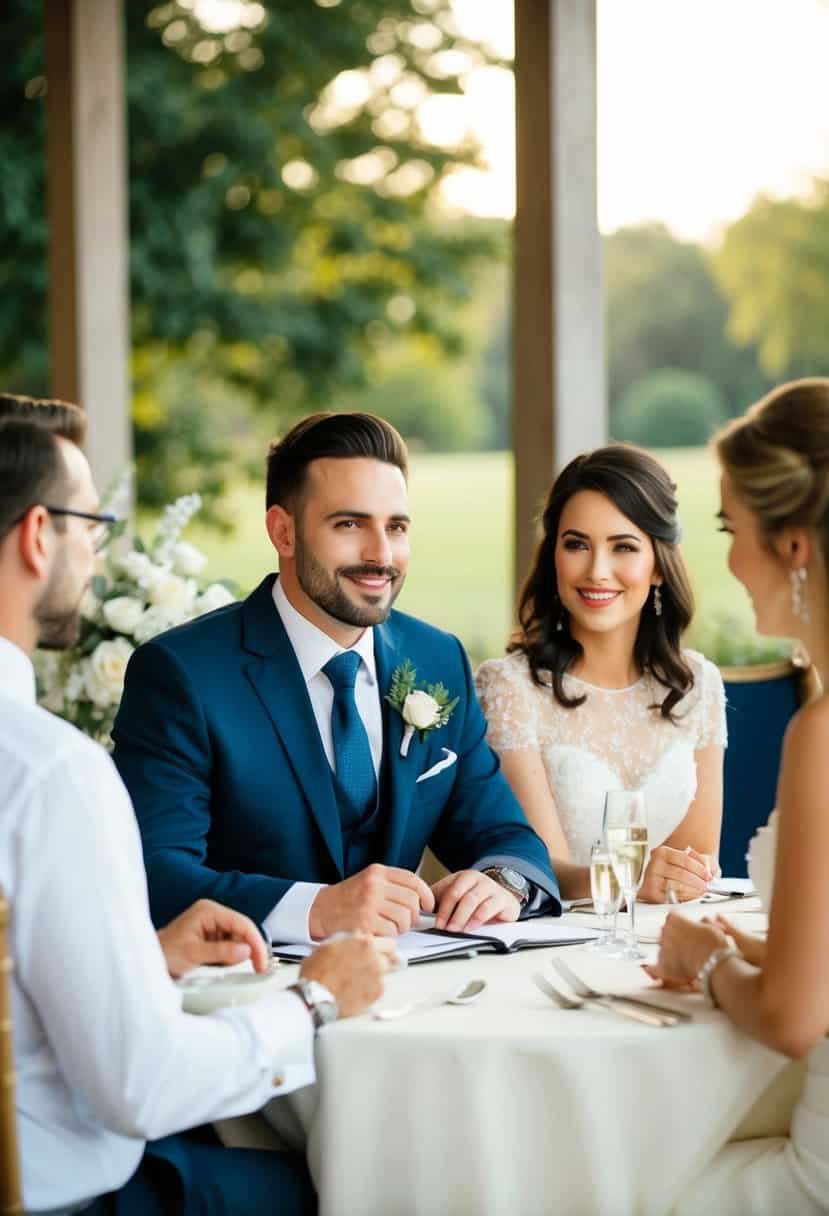What is the First Step Before Getting Married? Key Tips for Couples
Getting married is a major milestone in any relationship, marking a new chapter filled with love and commitment. Before you dive into wedding planning, the first essential step is having an open and honest conversation with your partner about your future together. This discussion lays a solid foundation for your marriage by ensuring both of you are aligned on important aspects like finances, family goals, and personal values.

Once you have had this pivotal conversation, you’re ready to explore the practical steps of getting married.
Research the legal requirements for marriage licenses in your area and gather any necessary documents. Understanding these requirements will save you time and stress later on the checklist journey.
In addition to the legal and financial aspects, consider how you both envision your life together.
Discuss what marriage means to each of you and how you plan to maintain a strong partnership through the years. This can strengthen your bond and ensure that your relationship grows even stronger as you embark on this beautiful journey together.
Understanding the Legalities

Before you get married, it’s crucial to understand the legal steps involved. From obtaining a marriage license to dealing with family law, each part has specific requirements to ensure your marriage is recognized by law.
Marriage License Essentials
Getting a marriage license is a critical first step. You usually need to visit a local government office, such as a courthouse or city hall.
Depending on your location, you might need to provide documents like a birth certificate or driver’s license, verifying your identity and age. Sometimes, both you and your partner must be present, but in other places, just one of you needs to apply. You’ll also pay a fee, which varies by state.
Some states may also require a waiting period after you apply before you can use your license. Familiarize yourself with the specific requirements for marriage in your area to avoid any last-minute surprises.
Marriage Certificate Procedures
After the wedding, securing a marriage certificate is essential. This document proves that your marriage is legally recognized.
Usually, your officiant will file the necessary paperwork with the local government, but it’s wise to check this .
Once filed, you can request a copy from the vital records office in your area. Fees apply for this service, and processing times can vary. Whether you’re changing your name or updating your status on legal documents, a marriage certificate is a must-have. It’s often required for dealing with insurance, taxes, and immigration matters.
Family Law and Prenuptial Agreements
Understanding family law is beneficial for managing your new life together. Consulting a family law attorney can help you navigate complex legal issues, especially if you or your partner have prior commitments or children.
Discussing prenuptial agreements might also be a wise move. These legal documents outline the division of assets in case of divorce and can be a proactive way to protect both parties. They cover aspects such as property and financial responsibilities, and having an agreement can provide peace of mind and prevent future conflicts within your marriage.
Emotional Readiness and Relationship Assessment

Being emotionally prepared for marriage involves understanding your emotions and those of your partner. Assessing your relationship’s strengths and weaknesses can help create a solid foundation for your future together.
The Significance of Premarital Counseling
Premarital counseling is a valuable step for couples looking to strengthen their relationship before marriage. It typically involves several sessions with a therapist, where you can discuss important topics like finances, children, and roles in marriage.
This process helps you and your partner improve communication and address potential issues early on.
Discussing trust and intimacy with a professional can lead to a deeper connection. By attending these sessions, you both learn how to build respect and practice forgiveness. Couples who participate often find they are better equipped to handle the ups and downs of married life together. Seeking guidance from a counselor can truly enhance your relationship by providing tools for a successful marriage.
Evaluating Compatibility and Conflict Resolution
Evaluating your compatibility involves having open discussions about core values, life goals, and daily habits.
It’s important to talk about how you handle conflict and find common ground. Assessing how you and your partner resolve disagreements now can save a lot of stress later.
Consider discussing your expectations around dating and personal space. This allows both partners to express their needs and helps maintain a healthy balance.
Developing conflict resolution skills is vital, as every couple will face challenges. Being ready to listen and compromise builds a stronger bond, making it easier to navigate life’s hurdles together. Understanding each other’s perspectives and practicing patience contributes significantly to a happy, long-lasting marriage.
Financial Planning and Management

Before getting married, it’s crucial to have a strong plan for managing your finances. Discussing finances and deciding on marital property can help you avoid surprises later. Creating a successful marriage budget is another essential step to ensure financial harmony.
Discussing Finances and Marital Property
Start by having an honest conversation about your financial situation. Talk about your income, debts, and spending habits.
Decide on how you will handle your assets, which could include setting up a prenuptial agreement. This agreement can protect your individual assets and clarify ownership of marital property.
Discuss how you plan to manage bank accounts. Will you have joint accounts, or will you maintain separate ones? This decision can affect how you manage expenses and savings. Understanding your joint financial goals, like buying a home or saving for retirement, is important. Open communication helps prevent misunderstandings about money.
Creating a Successful Marriage Budget
To create a budget that works, list all your monthly expenses and sources of income.
Make sure to include fixed costs like rent and utilities, and variable expenses like groceries and entertainment. It’s vital to set aside some savings for emergencies and future goals.
Deciding how to allocate funds can be tricky. Consider setting up a joint account for shared expenses while keeping individual accounts for personal spending.
Be flexible, as financial situations can change. Regularly review your budget to make adjustments as needed. A strong budget helps you both stay on track financially.
The Social Dynamics of Marriage

Marriage often involves balancing various social relationships and expectations. Understanding and managing these dynamics can lead to a more fulfilling relationship. You will encounter different interactions with family and friends, and it is important to build a strong support system.
Navigating Family and Friend Dynamics
When you get married, you blend your life with your partner’s, which includes their family and friends. It’s crucial to maintain open and effective communication.
Discussing boundaries and expectations with your partner ahead of time can help mitigate potential conflicts.
Developing trust within these circles is key. You might need to make compromises to accommodate family gatherings or friend outings. Keep a flexible approach to handling these events.
It’s also important to consider how you both plan to celebrate holidays and special occasions with family and friend groups.
Sometimes, families have strong opinions about marriage. Engage them in conversation by asking for advice, but make it clear that decisions will be made together as a couple. This approach fosters a healthy marriage and respects family input while reinforcing your autonomy.
Building a Network of Support
A solid network of support from family and friends can make your marriage stronger. This network acts as a safety net during difficult times. Building it involves maintaining pre-existing relationships while being open to new connections.
Engage with your community by attending social events together. This can widen your support circle.
Seek out mentoring relationships with older couples; their experiences offer valuable insights.
In this process, you might discover who truly roots for your happiness. Encourage open dialogues with trusted individuals who provide emotional support and practical advice. Surrounding yourself with people who value your marriage will help you navigate its complexities.
Planning the Wedding Ceremony

Planning a wedding ceremony involves selecting the perfect venue, understanding essential elements of the ceremony, and making the experience memorable for you and your guests. Each step is crucial for creating a beautiful and personal celebration.
Choosing Your Dream Venue
The first step in planning your wedding ceremony is finding the venue that fits your vision.
Consider whether you want an indoor or outdoor setting. Think about the size of your guest list and ensure the venue can accommodate everyone comfortably. Many couples choose places with beautiful views or unique features that reflect their style. Booking early is key since popular venues can fill up months in advance.
Keep your budget and location preferences in mind. Do you prefer a local venue easily accessible for guests, or a destination setting for a more adventurous celebration?
Visit potential venues, talk to coordinators, and compare different options. Make note of any restrictions or requirements each venue might have regarding decorations, vendors, or time limitations.
The Marriage Ceremony Essentials
Understanding the key components of your marriage ceremony is vital. Whether you’re having a religious, non-religious, or civil ceremony, certain elements are common.
The processional marks the beginning, followed by the officiant’s welcome. Include vows, which can be traditional or personally written, and the exchange of rings.
Music choices should reflect your style and set the tone for the ceremony. Make a playlist or hire musicians. Don’t forget legal requirements such as obtaining a marriage license and selecting an officiant who can legally perform the ceremony in your area. Check with your venue for any specifics, like sound systems or seating arrangements, to ensure everything goes smoothly.
Creating a Memorable Experience
Creating a memorable experience goes beyond the basics. Personal touches make your wedding stand out.
Consider incorporating special readings, songs, or rituals that signify your relationship. Decorate the space with flowers and colors that complement your theme.
Work with a planner to design a layout that enhances the atmosphere.
Think about guest comfort and enjoyment. Provide programs so everyone knows what to expect, and consider unique gifts or favors.
Capture the moment with a photographer or videographer, so you can treasure the memories long after the day.
Every thoughtful detail contributes to making your wedding ceremony a cherished experience for everyone involved.



